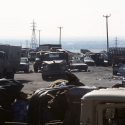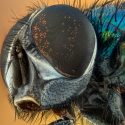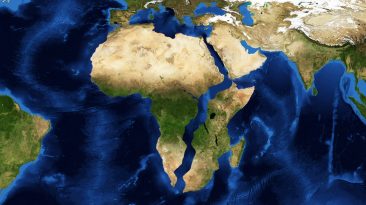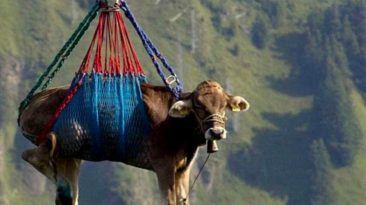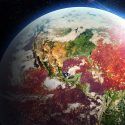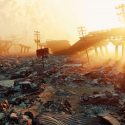Deforestation is happening all around the world. Approximately 15 billion trees are cut down every single year. Despite some forest getting replanted, if we keep going at this rate, we’ll have no trees in about 200 years. But what if that were to happen right… now.
What would happen to our air quality? What would happen to animals? And do trees hold the key to our food supply?
No more note taking, no thank you cards… you’ll never be able to take a pen to paper ever again, but take a look at the bigger picture — you’ll have a lot more to worry about than that when it comes to not having any trees.
One of your biggest worries might be the air we breathe. It’s no secret that trees produce a lot of our oxygen, but just how much? Well, not as much as you might think.
Through the magic of photosynthesis, trees produce roughly half of the oxygen in our atmosphere. We have the oceans to thank for the other half. With the oceans still intact we should still be able to breathe, but it won’t be what you’re used to.
First, let’s break down exactly how this might be possible. Well, it’s pretty far fetched, but in order for us to cut down all our trees, we’d have to give everyone on Earth between the ages of 15 and 65 a chainsaw and ask them to cut down about 625 trees each. If everyone on Earth were on board with this appalling assignment, we’d be finished this task in just under a year.
And what exactly would we do with all these fallen trees on the ground? Well, we’d process quite a bit of them; continuing to make the various products we do today, but the vast majority of them would most likely just lay on the ground and rot. And when they do, over 35 billion (yes, billion) tons of carbon dioxide would be released into the atmosphere, since trees release the gas when they break down. To put that in perspective, that’s much more carbon dioxide than the United States, Canada, and the U.K. produce in a single year.
[dx_custom_adunit desktop_id=”RTK_CDE4″ mobile_id=”RTK_SUFd”]It’s a catastrophe that would most likely kill our planet in short order. It’s not likely that the population of Earth is going to agree to chop down every tree on the planet. What if these trees all suddenly disappeared and we didn’t have to cut them down?
Let’s lighten this scenario up a bit and start with a few good things that will come with not having any trees. You can say goodbye to forest fires. Every year, forest fires around the world burn down millions of acres of forest, destroy thousands of buildings and kill hundreds of people.
The largest-ever forest fire in California was responsible for destroying over 18,000 buildings and cost the state and insurers over $16 billion. With no trees, people in places like Californian could rest easy knowing their home is a bit safer. Sure fires could still happen with grass and shrubs, but firefighters say those fires are much less dangerous and easier to contain.
And think of all the spare time you’ll have, because of how much less yardwork you’ll be dealing with. It’s estimated that you’re probably raking half a million leaves every year. Depending on the size of your yard, this could take upwards of a dozen hours annually. Now, you can use that time for something better, but unfortunately, you may have to use it to figure out a way to survive.
That’s because you’d probably have trouble breathing in this treeless world. An average tree produces enough oxygen each year for ten people to breathe. The Earth has trillions of trees producing more than enough oxygen to sustain the human population. But with all these trees gone, you’d quickly notice the world’s air supply diminishing. It’d be up to the ocean’s phytoplankton to provide our entire supply of O2.
People would have trouble breathing. We wouldn’t last too long. Remember, the world’s population increases over time; eventually, the oxygen provided by the oceans wouldn’t be enough to sustain us. And if we continued to pollute the air, which, let’s be honest we would, the quality of the air we were trying to breathe would continue to degrade.
Oxygen wouldn’t be the only thing we’d have less of. It’s pretty unlikely any new homes would be built without any new trees, at least not the traditional houses that we know today.
A simple, 110 square meter (1,200 sq. ft.) house requires thousands of pieces of wood. From the basic frame to your walls and floors. And what about furniture? No more chairs, tables, desks… the list goes on. Houses in a world without trees would look vastly different. Sure there are other materials we could use: metal, glass, mortar, concrete. But this would increase costs significantly. And even today, houses built with those materials typically use some amount of wood as well. Not only that, some of these materials, like glass and concrete, will probably cease to exist one day. The world has a finite amount of sand, and we’re quickly running out of it. Too bad, because sand is an essential ingredient in making glass and concrete..
Now, not to be too crass, but what to do about number two. No paper also means no toilet paper. What will you wipe with? The billions of pieces of toilet paper we use every day will be gone. You won’t be able to use leaves, as those will be gone too. Instead, you’ll be joining the 4 billion people around the world who use water to clean themselves after going to the bathroom.
But enough about that, what about all the other animals on the planet? According to the Nature Conservancy, 50% of the world’s plants and animals live in the rainforest. We’re talking about snakes, monkeys, pandas, elephants and whatever else is lurking in there. And that 50% isn’t even including all the animals in the world’s other forests like deer, rabbits and thousands of bird species. Without forests where would all these animals live?
Unfortunately, most of them would probably cease to exist; just like with current deforestation that kills millions of animals a year, and has made many of them extinct. Evicted from their natural environment, it’s unlikely that these animals would be able to adapt to someplace new in such a short time. Homeless predatory animals like bears and wolves would probably be hunted pretty quickly in order to keep humans safe. It’s likely that the small number of animals that would survive in this world would be living much closer to humans as scavenging may be their only way of sourcing food.
It won’t just be our furry woodland creatures who are in trouble. It’ll be bugs, too. Insects depend on vegetation for survival. They burrow into trees for shelter, and eat leaves for food. Without these, it’s safe to say that nearly all insects will become extinct.
In fact, it’s already happening. A 2019 study determined that insect populations are decreasing by 2.5% every year. This is primarily due to deforestation, and with every single tree removed from Earth, you can expect the insect population to diminish at a faster rate than ever before.
Apart from keeping animals alive, trees also help immensely with cleansing chemicals from the air. The leaves of trees absorb various pollution particles from the atmosphere. Without trees, you’d quickly notice a lot more contaminants in the air.
More pollution in the air means more people dying. In 2015, 6.5 million deaths were linked to air pollution. One acre of trees absorbs roughly 2.5 tons of carbon dioxide every year. Without this absorption, the negative effects of climate change increase significantly.
Expect the Earth to get a lot hotter. Trees help cool the planet in a number of ways. Not only do they provide shade, but they also release water through photosynthesis. This helps cool down areas by several degrees and provides rainfall.
Photosynthesis takes water from parts of the tree and delivers it to the atmosphere. The water goes into the clouds and produces rain for the trees to absorb once again. Without this water cycle, we’d see reduced rainfall. Researchers from Humboldt University in Berlin estimate that if the Amazon rainforest were to lose all of its trees, rainfall there would decrease by 20%. This would bring on chronic droughts all across the globe, causing lower water levels in lakes and ponds. The droughts could get so bad as to cause severe water shortages around the world, leading to millions of deaths.
Less rain might sound like a good thing, but when it does rain, expect massive storms that could seriously affect the Earth. Dangerous mudslides and soil degradation are all a serious possibility.
What’s that? Is your stomach grumbling? Yeah, that’ll happen a lot more without trees. Think of all the food they provide. Bananas, coconuts, apples the list goes on. And, aw man, no more maple syrup on your pancakes since it’s made from sap drawn directly from maple trees. Things like chewing gum, some candies, and even some makeup will no longer exist, as they’re derived from the wax of carnauba palm trees. But that’s not all. In addition to directly providing us with food, trees are also an essential part of all other food production.
That’s because of the trees’ special relationship with the soil. Trees absorb a lot of the chemicals in precipitation that would otherwise go into our soil. Not only that but trees also protect soil from erosion by the rain, and they absorb water from the ground when it gets too wet.
We are predicting drought, but when the rare rains do come, they’ll render the soil practically useless. With our soil degraded and full of chemicals, you can say goodbye to all sorts of vegetation from crops to grasses, to plants. Our world would quickly look like a desolate wasteland. Not only would it look pretty ugly, but it would have a severe impact on the agricultural industry.
Crops wouldn’t grow, and if they did somehow manage to sprout, they’d be too unhealthy for us to eat. Not to mention, without insects like bees and butterflies to pollinate our crops we’d have an even more difficult time growing anything — no more vegetables, fruits, bread or nearly any other type of food that you enjoy daily. So if the poor air quality doesn’t kill humans, the food shortage probably would.
This has been pretty traumatic, hasn’t it? No more food, animals, and eventually no more humans. We should probably console each other over a nice warm campfire. Wait… we won’t be able to do that either. Okay, maybe being a tree hugger isn’t so bad. Although we could kiss forest fires and leaf raking goodbye, would it really be worth it? Definitely not.
Hopefully, we never have to worry about this. As long as we keep planting our trees, saying no to deforestation and most importantly continuing to watch WHAT IF.
Subscribe to What-If on Youtube or follow the show on Facebook Watch.
Sources
- “No Trees… No Humans. | Our Science | Learn Science At Scitable”. 2019. nature.com. Accessed March 9 2019.
- “What Would Happen If All The Trees Were Cut Down?”. Earth, Planet. 2019. BBC Science Focus Magazine. Accessed March 9 2019.
- “What Would Happen, If We Cut Down All Of The Trees? – Quora”. 2019. quora.com. Accessed March 9 2019.
- “How Does Cutting Down Trees Affect Us And Our Environment? | Save Trees”. 2019. multiwood.in. Accessed March 9 2019.
- “A World Without Trees | Www.Scienceinschool.Org”. 2019. scienceinschool.org. Accessed March 9 2019.
- “Trees And Air Pollution”. Schlesinger, William. 2017. Cool Green Science. Accessed March 9 2019.
- “Top 22 Benefits Of Trees”. 2015. Treepeople. Accessed March 9 2019.
- “Deforestation And Climate Change – Climate And Weather”. Media, Ali. 2019. climateandweather.net. Accessed March 9 2019.
- “Living Among The Trees: Five Animals That Depend On Forests”. 2019. World Wildlife Fund. Accessed March 9 2019.
- “How Many Leaves Fall From Trees Every Year? – Quora”. 2019. quora.com. Accessed March 9 2019.




